Iron Monkey (1993)
Directed by: Yuen Woo-Ping
Written by: Elsa Chang, Tai-Mok Lau, Tan Cheung, Tsui Hark
Starring: Angie Tsang, Donnie Yen, Jean Wang, Yu Rong-Kwong
AKA SIUNIN WONG WONG TSI TITMALAU
Hong Kong
AVAILABLE ON BLU-RAY: NOW, from EUREKA ENTERTAINMENT
RUNNING TIME: 90 mins
REVIEWED BY: Dr Lenera, Official HCF Critic
During the day, physiciam Yang Tianchun runs his clinic and provides free medical treatment for the poor, which he subsidises by charging his rich patients. At night, he dresses in black and travels around town to rob the rich and help the poor. When another physician Wong Kei-ying arrives in town with his young son, Wong Fei-hung, and has a fight with Iron Monkey which results in a draw, the corrupt governor Cheng Pak Kon holds Wong Fei-hung hostage to force Wong Kei-ying into capturing Iron Monkey within seven days.…
An exhilarating, even delirious fight fest of the kind that Hong Kong cinema does better than anyone else, Iron Monkey may not quite be one of the all-time masterpieces of the wuxia genre, but it gets pretty close and should probably serve very well as an introduction to this kind of film if you’re new to it or have only seen Crouching Tiger, Hidden Dragon which at the time of its release so many people were saying introduced an amazing new style of action despite Hong Kong movies having been delivering this kind of thing for ages. It doesn’t try to provide much that’s new in terms of story line, the plot basically combining Robin Hood – or should that be Zorro? – with as many martial arts movie cliches as the four screenwriters can cram in. Certain elements aren’t developed or are even forgotten about, while logic is increasingly thrown out the window even if you accept that this is a film in which martial artist can do amazing feats. But the action really is the most important thing here, and it certainly delivers, even in these days of endless CGI, almost existing in a middle ground between classical earth-bound martial arts action and the digitally dominated showdowns in today’s superhero movies, though here the fact that most of the combatants are skilled martial arts really showing off what they can do makes things extra-exciting, and frankly some of the stuff they pull off in these movies are remarkable considering the low budgets.
Bearing no relation to the 1977 Shaw Brothers movie of the same name, Iron Monkey is just one in a long list of over 100 films and TV series featuring Chinese folk hero Wong Fei-Hong. The Tsui Hark-produced Once Upon A Time In China series begun in 1991 and was very popular, but after the third film star Jet Li said that he’d tired of the role [though he did return for the sixth episode] so Tsui thought it would be a good idea to make a prequel with Wong as a child. Just after director Yuen Woo-Ping [you will have seen his name as fight choreographer on many American films, but he also directed too including a certain classic called Drunken Master] had finished the film, Tsui shot some additional comic scenes, causing a six month delay that may have had a negative effect on the film’s box office earnings which weren’t very high at all in Asia. A 2001 American release though became the eleventh highest-grossing foreign language film in the United States. Unfortunately, as with most of the Jackie Chan films released theatrically but to an even greater extent, this version was heavily altered, removing much of the humour including comic bits in the fight sequences, slowing down under-cranked [sped up] action to a more normal pace, adding a new music score and rewording much of the subtitles so some elements of the story were changed like Miss Orchid having been a prostitute. I haven’t seen this bastardised version but thankfully it’s never been released here in the UK.
So the first of our two [or should that be three?] of our heroes is a mild-mannered doctor by day and a black-clad masked martial artist saviour of the poor by night. We first see him break into Governor Cheng’s residence and make off with a horde of gold despite the efforts of the guards and some Shaolin monks [interestingly, all the Shaolin monks in this film seem to be evil]. After leaving a note with a picture of a monkey on it saying: “Thank you for your donation to the flood. Because of your kind donation I won’t kill you”, he does indeed give much of the gold to homeless flood victims, then some kids being forced to work. He tends to hang around for long enough so that no greedy sod takes it all for himself too. Of course Captain Fox claims that he wounded Iron Monkey then let him go, but Cheng, the sort of governor who likes to bleed the poor dry, fails to believe him. Cheng, played by Chinese pop singer James Wong, is as over the top an evil pantomime villain as you could ever imagine, the screenwriters giving him as many unpleasant characteristics and cruel things he likes to do as possible, and Wong going totally over the top. About two thirds of the way through he’s replaced by another guy who’s also as over the top an evil pantomime villain as you could ever imagine, though at least Yen Shi-kwan can fight. It’s not long before Wong Kei-ying, another physician, appears with his son, Wong Fei-hung, but they’re arrested along with an assortment of other folk including an actual monkey because one of them could supposedly be Iron Monkey. The film’s sometimes awkward mixing of humour and seriousness is epitomised in a trial scene in which the monkey flashes his bottom at Cheng before poor Wong Fei-hung, a ten year old boy, nearly gets thirty lashes – which in fact he does later on.
Wong Kei-Ying is forced to hunt down Iron Monkey while the latter considers springing Wong Fei-hung from jail, and it might have been more dramatic if we could have had Yang considering turning himself in to save the boy instead. Instead, the story developments get progressively sillier though you just know that the two physicians are going to team up at some point. I also wondered if we were going to get some romance between Wong Kei-Ying and Miss Orchid, an ex-prostitute who’s very sad past is revealed in a rather haunting blue-tinted flashback brought on her singing a song to Wong Fei-Hung, and who now lives with Yang in a sort of – well – I’m not sure what it is. There seems to be some kind of love between them, though it’s more like a brother/sister relationship. There’s a sweet little moment when Miss Orchid’s and Wong Kei-Ying’s hands practically touch when she gives him something, and later on they do some cooking together, but nothing is made of this seeming attraction. Perhaps some material was cut to favour the action. The attempts at political commentary don’t always come off either, sometimes being too broad or comical, though some of the comedy, if at times awkwardly inserted, does work, such as when Cheng is put on trail by the good guys, even if it’s yet another example of that bizarrely common Hong Kong film cliche of people being mistaken for someone else despite wearing terrible disguises. And it’s tremendous fun to see the young Wong Fei-Hung beginning to become a martial arts expert. His several fight sequences in which he spends much time ducking and diving and using whatever is around him [you won’t forget the umbrella!] resemble those of Jackie Chan, and are a joy to watch, especially with the thirteen year old playing Wong Fei-Hung clearly a pretty adept fighter already. Try and count the number of different stances she adopt in her final fight, and yes – this thirteen year old is actually a girl, Angie Tsang playing a boy, though truth be told it’s not very obvious. The relationship between father and son is nicely handled, quite touching without becoming sappy.
Yuen Woo-Ping is at the peak of his powers as fight choreographer, the blows looking like they genuinely hurt despite all the jumping around. The second half barely slows down for breath and the end battle atop poles with a fire raging below makes for an exciting finale and there’s usually some actual fighting expertise shown throughout. Alongside a variety of weapons from swords to an iron chain, the animal styles including the snake and crane are on display, plus the no-shadow kick that we see in the Once Upon A Time In China films, though it’s the seemingly undefeatable Hin-Hung that has the best moves – the Flying Sleeves [pretty much as described] and the King Kong Palm. With exchanges like: “Your kung fu is good, you even recognise my King Kong Palm”. “It’s nothing special”. “Then try my Nothing Special move”, there were times I was in martial arts movie heaven in a film which, despite all its borderline fantastical stuff [much of which is achieved by clever editing], sometimes has a nice old school 1970’s feel about it. Many of the kick-ass moves are described by the person exacting them, which is just terrific! My favourite bit of action though may be near the beginning in which some prescriptions are blown around and Yang and Miss Orchid effortlessly retrieve them. I also liked how the film seemed to saying how one should try to get the right balance between discipline and “doing your own thing” rather than insisting just on the former.
Yu Rong-Kwong and Yen are both fine, and I haven’t yet mentioned Li Far as ‘The Witch’ who turns up to do some fighting every now and again. Despite normally being a stuntwoman, she has a striking presence. Yen’s best non-fighting moment is probably when, against his rigid principles but not having eaten for two days, he surreptitiously picks up a dropped dumpling and pinches food from Miss Orchid’s kitchen. My favourite performance though comes from Yuen Shun-yi as Fox – yes, he’s rather broad like some of his co-stars, but he’s also allowed to play someone whom you are able to change your opinion of and he manages his journey in which he starts off as someone you hate but finishes as somebody rather more likable quite well. The music score, also credited to four people, is forgettable except for its frequent uses of the famous Wong Fei Hong theme – though visually this is quite a pleasing film, with the day time scenes having a nice glow about them. As I said before though, it’s all about the fighting, and that’s not meant as disrespect. It’s all about stuff like people hopping from the tops of the heads of others, pausing only to deliver a kick or to rip off a moustache. When this kind of stuff is taking place on screen, it’s hard to care about anything else.
Rating: 









Iron Monkey comes to Region ‘A’ Blu-ray is a stunning transfer – though it’s so stunning that one can occasionally make out the wires. The colours and details are especially effective. I flitted around between the various audio options and, probably because I have a fairly simple home video setup, found the original Cantonese mono to be the most pleasing. The 5.1 track has a greater dynamic range but is tends to be much quieter during the non-action bits. One thing’s for sure – the English dub is pretty awful, and this is coming from someone who still has a fondness for the old school 1970’s dubs. It’s terribly recorded, lacks much character and actually has less goofy lines which has got to be wrong.
Eureka have ported over most of the special features from the Hong Kong Legends Platunum Edition DVD, though for some reason the Bey Logan/Donnie Yen commentary is missing as is a split screen commentary for some scenes featuring the two. It doesn’t matter though, because there’s more than enough other extra material on here that provides plenty of insight into the film. Just compare this to the Region ‘A’ Blu-ray from Lionsgate that in addition to only containing the US cut has just two very short interviews with Yen and Quentin Tarantino.
First up is a twenty minute Yen chat who displays some moves in addition to talking about the film, in particular how he contributed many ideas including bringing back an updated version of the hung gar style which had been common in the 1970’s [so that’s one major reason why it had a slight 70’s feel – having only a limited knowledge of actual martial arts despite watching many martial arts films I didn’t notice!]. Hark tends to talk more about his Once Upon A Time In China films but still has some insightful things to say in his twenty-five minutes. The twenty-three minute Rong-kwong chat goes into his Peking opera background and his co-stars including Fai who appears next to talk for twenty-five minutes. I actually found her and Tsang to be most of interest. Fai goes into her career as a stunt woman and says how it was a fellow stuntwoman breaking a leg on Jackie Chan’s Operation Condor: Armour Of God 2 that caused her to change jobs. Tsang in her twenty minutes seems to have a good memory and has some interesting recollections. She says that her casting was accidental, though others give rather vague reasons for this.
Iron Fist has Yuen Cheung-Yan, Yuen Woo-Ping’s brother, look at the visual style and nature of the fight scenes for sixteen minutes, which is followed by Alex Yip demonstrating several different versions of one fight for eight minutes. And finally we have nine minutes of footage from the 7th World Wu-shu Championship that was held in Macau in 2003, featuring Fai and Tsang.
Iron Monkey doesn’t attempt to transcend its genre or educate about the martial arts or get all mystical, it just keeps it straightforward, and therefore ought to appeal to many viewers who just have more of a casual interest in this kind of film. I think that kids will also love it. Eureka’s packed edition of the film comes Highly Recommended.
DETAILS
*Limited Edition O-Card (First print run only]
*Stunning 1080p presentation from a brand new 2K restoration
*Original Cantonese mono audio track [also available in 5.1 presentation]
*5.1 English audio track
*Isolated music & effects track
*Interview with Donnie Yen
*Interview with producer Tsui Hark
*Interview with Yu Rong-kwong
*Interview with stuntwoman and actress Li Fai
*Interview with Angie Tsang
*Iron Fist- a behind-the-scenes look at the action choreography of Iron Monkey
*Shadow Boxing – a featurette on Hong Kong action choreography featuring Alex Yip
*Footage of Li Fai and Angie Tsang competing at the 2003 Wu Shu Championships
*Original theatrical trailer
*A collector’s booklet featuring a new essay on the film [First print run only]

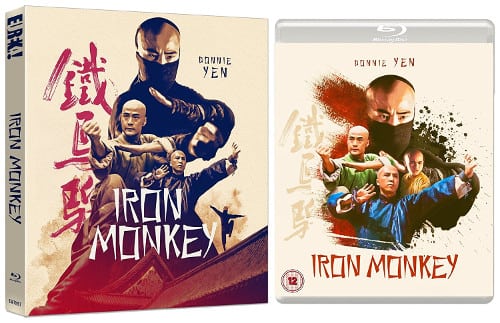
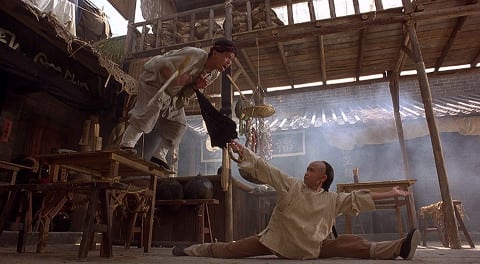
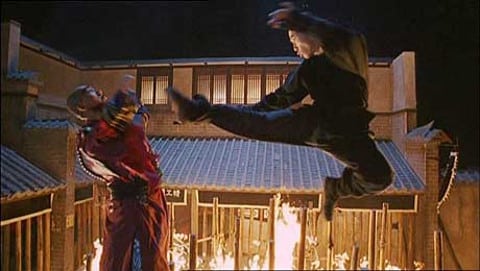

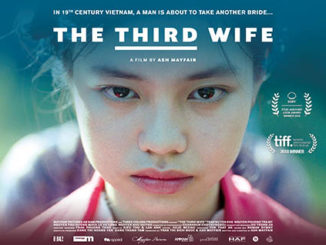
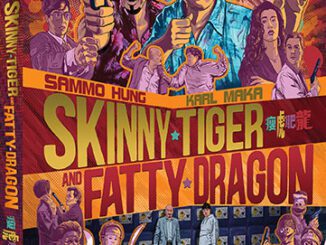
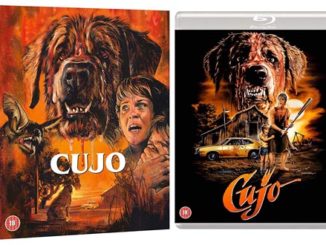
One of my faves! Wonderful to see Eureka getting out a few of the classics.